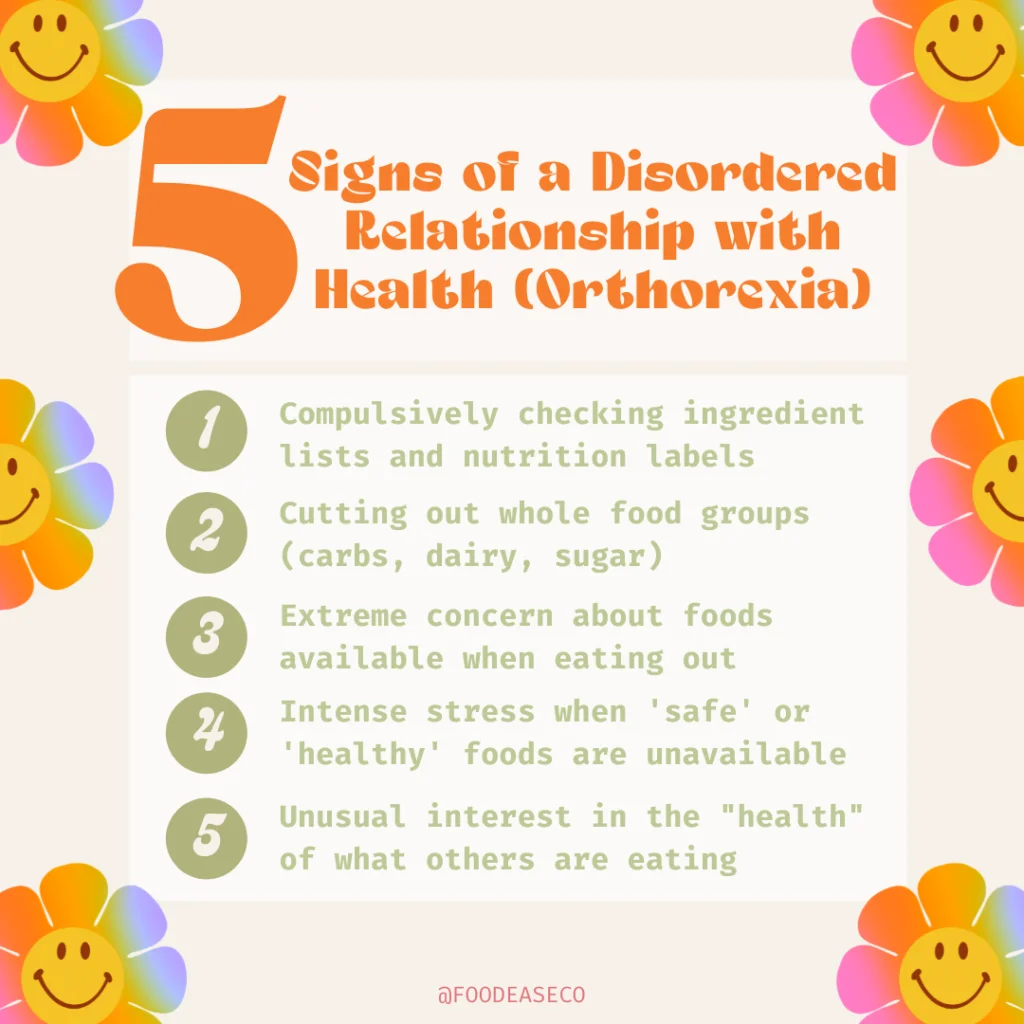Orthorexia

Introduction
In our last blog posts, we covered the 10 Principles of Intuitive Eating. When becoming more aware of what and how you eat, it can be easy to become a bit too concerned. Engaging in physical activity and eating a balanced diet have many benefits both mentally and physically. However, when your “lifestyle” becomes obsessive and rigid, allowing little to no flexibility in schedule changes, it may be beneficial to seek support.
Orthorexia Nervosa (ON) is a type of disordered eating habit when an individual has an obsession with “healthy” eating. This obsession can be so strict and rigid that it can actually be damaging to health and well-being. In the most current Diagnostic and Statistical Manual of Mental Disorders (DSM-5), Orthorexia is not recognized/included. Regardless of this, there are still several warning signs and symptoms of ON to be mindful of.
Common Signs and Symptoms of Orthorexia:
- A concern of ingredient lists and nutritional labels of food
- Cutting out or restricting various food groups (all sugars, all carbohydrates, all dairy) in concern of “health”
- Feeling stressed and concerned about what you will eat at restaurants, events, family gatherings, etc.
- Obsessively following “healthy lifestyle” accounts on social media
- Body image concerns may or may not be present
There are no current clinical treatments specifically for ON, but it is often treated the same as anorexia and/or obsessive-compulsive disorder (OCD). It is common to see ON concurrent with OCD. Treatment will focus on weight restoration if needed, breaking food rules, and exposure to “fear foods”.
A question that you may find yourself asking is: “am I ‘sick enough’ to seek treatment for a suspected eating disorder?” The short answer is yes. If you notice yourself or someone you know is starting to constantly be fixated on weight, nutrition, or exercise it is beneficial to speak to someone and start the support process. Early treatment for eating disorders is critical to minimize the physical and emotional consequences. Studies have found that early intervention can reduce the chance of relapse by 50%. If you are asking yourself “if you are sick enough” that is enough to seek additional help and support.
Health consequences of ongoing ON:
- Muscle wasting: consuming inadequate calories will cause a lack of energy for the body. In order for the body to get energy, it will then start to break down its tissue starting with the muscles.
- Decreased blood pressure: the heart is considered a muscle and will have less fuel to pump blood.
- Decreased metabolic rate: as the body attempts to conserve energy due to lack of intake.
- Gastrointestinal (GI) tract problems: such as stomach pain, bloating, constipation, etc. as the GI tract slows down.
- Difficulty concentrating and fatigue: the brain consumes up to one-fifth of the body’s calories and relies on carbohydrates as its main fuel source.
If anything from this blog post sounded like something you may be struggling with, please reach out for support and help. It is possible to recover from ON with early intervention and the right support. The road to recovery is not easy, but the work is worth gaining your life back.
If you are looking for additional support the Food Ease Team can help!
Sources:
National Eating Disorders Association. (2018, February 22). Health consequences. https://www.nationaleatingdisorders.org/health-consequences
National Eating Disorders Association. (2019, December 13). Orthorexia. https://www.nationaleatingdisorders.org/learn/by-eating-disorder/other/orthorexia
Why you are already “sick enough.” (n.d.). Beat Eating Disorders. https://www.beateatingdisorders.org.uk/your-stories/anorexia/already-sick-enough/
Have a Question?


Do you have any questions or suggestions? Feel free to contact us! Just leave your email here, and we will get back to you shortly.